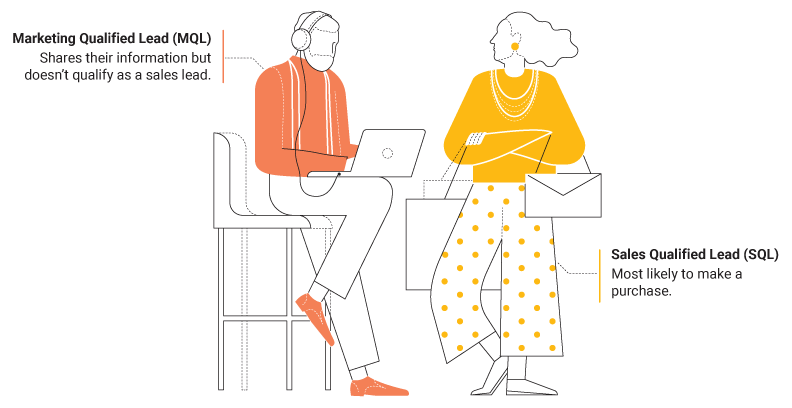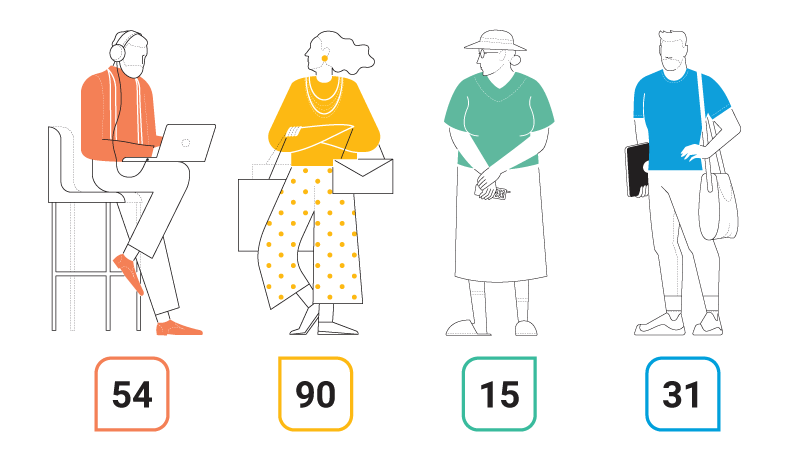Leads.
Prospects.
Potential customers.
You’ve likely read it and heard it said multiple ways. But do they all mean the same thing?
All of these terms tend to refer to someone who is interested in your products or services.
Oftentimes they’ll inform you of their interest by sharing their contact information with you. For instance, when leads online submit their name and email address in exchange for a special offer you’re advertising, that individual becomes a lead for your business.
An important asset to the growth of your business, continuously connecting with leads online is necessary. That said, marketing departments and sales departments often differ in what they consider to be a lead. So, it’s important to create a definition within your organization that everyone can agree to.
What is a marketing lead and what is a sales lead?
Not every single lead collected will result in closing a sale. This isn’t a reflection on you or your business, it’s simply the nature of marketing yourself. By marketing your business, you will undoubtedly collect information from individuals with whom your message resonated.
These individuals are known as leads. However, sharing their information with you does not automatically qualify them as your ideal customers. Rather they become what is known as a Marketing Qualified Lead or an MQL. Here are a few ways your business might collect MQLs:
- Attending an online workshop which they had to sign up for
- Signing up for communication such as a newsletter
- Downloading content for which they need to enter their email
- Filling out a contact form
Nonetheless an MQL is ultimately an unqualified sales lead. Just because you have their information doesn’t mean you’re going to make money from them. Rather, your ideal leads need to meet a specific set of criteria in order to be sold, taking them from an MQL to an SQL or a Sales Qualified Lead, discussed next.

Ask the right questions
You may have originally been asking, “What is a lead?” But the true question you should be asking is, “How do I uncover what leads are most inclined to pay for my products or services?”
These leads are known as a Sales-Qualified Lead or SQL. What is a sales lead? They are the leads that sales efforts should be focused around as they are the individuals who are most likely to make a purchase. While it would be spectacular if they could give themselves away—a neon flashing email address for instance—specifying an SQL from an MQL takes more work and research.
Define your audience with lead scoring
An SQL varies based on your Ideal Customer Avatar (ICA) also called “personas.” What of your marketing qualified leads look the most like the person you envision selling your product or service to?
Consider important demographic and firmographic characteristics as you’re sorting them. You may collect these as part of your online process or you may need to have a brief discovery phone call to understand who they are, what they’re interested in, and how you may be able to help them.
One way to determine which of your MQLs may also be SQLs is through a process called Lead Scoring. Using numerical values, you prioritize your leads based on the information they’ve submitted to you as well as studying the ways in which they’ve engaged with your brand.
 Creating your Lead Scoring system will also require you to look at the leads who are MQLs but ultimately have engaged little with your brand beyond their initial interest. It is only once you understand both sets of data that you can figure out how to weigh lead attributes appropriately.
Creating your Lead Scoring system will also require you to look at the leads who are MQLs but ultimately have engaged little with your brand beyond their initial interest. It is only once you understand both sets of data that you can figure out how to weigh lead attributes appropriately.
Using your leads to their best advantage
Know that it’s nearly impossible to stop generating leads that are not SQLs. Additionally, it’s a bad business plan. That’s because even if someone does not meet your SQL criteria in the present, it doesn’t keep them from potentially becoming an SQL in the future.
That said, be sure to segment your lists by MQLs versus SQLs. This will help you to better target your messages to your audience.
So, you see—knowing “what is a lead” is not as simple as it may first appear. While a lead is another name for prospect or potential customer, there are varying kinds of leads that will enter your funnel. Better understanding who they are at this point in their journey is the trick to determining whether you can sell to them now or later.






